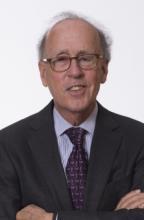The Russian Janus
LONDON – Russia presents two opposing faces to the world: one menacing, the other benign. Both have now combined, somewhat unexpectedly, to break the momentum carrying the United States, and possibly other Western powers, toward a disastrous military intervention in Syria.
Russia’s domestic situation remains deplorable. With the collapse of the planned economy in 1991, Russia proved to be not so much a developed as a misdeveloped country, unable to sell most of its products in non-captive markets.
So Russia regressed into a commodity-based economy, mainly selling energy, while its talented scientists and technicians sought jobs abroad and its intellectual life decayed. Russia is also, no surprise, blighted by corruption, which drives away foreign investment and costs the country billions of dollars annually.
This underlying debility has been masked by high energy prices, which, over the 14 years of President Vladimir Putin’s rule, have allowed Russia to combine the features of a kleptocracy with per capita income growth sufficient to quell dissent and create a shopping-mad middle class. The accumulation of reserves from the oil and gas industries can be used to develop much-needed infrastructure. But, for all the Kremlin’s talk of diversification, Russia remains an economy with a Latin American, rather than a Western profile.
Russia’s politics are equally dispiriting. If Western foreign policy has a guiding principle, it is the promotion of human rights. This has not influenced the Russian government’s domestic or foreign policies in the slightest. Instead, under the credo of “managed democracy,” Putin has established a soft dictatorship, in which the law is flagrantly used for political ends; and, when the law is insufficient, the state resorts to assassination.
As for human rights that are particularly valued in the contemporary West – those of dissenters and minorities, including sexual minorities – Russia seems to be on a completely different wavelength. Independent NGOs are harassed and dubbed “foreign agents.” Putin has appealed to Russia’s most reactionary forces by restricting gay people’s rights with legislation that Western countries abandoned years ago.
The decision to allow opposition leader Alexei Navalny to stand in Moscow’s recent mayoral election was a welcome move toward a more open system, but the political calculation behind it and the likelihood of vote rigging to prevent a runoff against his victorious opponent hardly suggest a Pauline conversion to democracy. The Putin regime occupies a space between dictatorship and democracy for which Western political science has yet to find a proper word.
But perhaps Russia’s indifference to human rights is a source of strength, not weakness. The trouble with the human-rights agenda is that its advocates become trigger-happy, whereas Russia’s foreign policy displays the virtues of conservative prudence. Its realism, which is shared by China, is thus an important counterbalance to the West’s intemperate urge to meddle in the domestic affairs of countries that do not live up to its proclaimed standards.
The case of Syria is a good example of this. There is no doubt that chemical weapons were used to kill hundreds of civilians in the suburbs of Damascus on August 21. The full facts have yet to be established – perhaps they will never be. It is probable, though not certain, that sarin gas was used by President Bashar al-Assad’s regime.
But, in a recent newspaper commentary, Putin raised a question that has surely occurred to others: What were the regime’s motives in using chemical weapons in the glare of international publicity? Putin suggested that the attack might have been “provocation” by Assad’s opponents. I do not claim to know the answer; but, as in any criminal investigation, the motive of possible suspects is always the right place to start. Who stood to gain?
True, Russians are prone to conspiracy theories, which is common in countries with an opaque power structure. But it is also true that the Syrian state is not centralized in the presidency, as was Egypt under former President Hosni Mubarak. Even if Putin’s “provocation” thesis is dismissed, it is possible that the chemical attacks were unleashed by rogue elements in the Syrian army, whose culpability Assad had to deny to preserve his own position.
Of course, Putin might know whereof he speaks. Many Russians believe that the Russian apartment bombings of September 1999, which killed almost 300 people, were plotted by elements of Russia’s own security services to provoke retaliation against the Chechens and propel Putin into the presidency on the back of a popular war. To this day, it is not known for certain who was behind the attacks.
The point is that under political systems as obscure as those in Syria – and Russia – no one knows who really controls what. It defies belief that the political successors of those who confidently launched the invasion of Iraq on the false evidence that Saddam Hussein had weapons of mass destruction should be so eager to be sucked into another bloody maelstrom.
They have been saved from this folly, at least temporarily, by Putin’s proposal to put Syria’s chemical weapons under international supervision and then destroy all of them. There are large practical difficulties in achieving this, and the Russian proposal, which has now been embraced by US President Barack Obama, does not meet the Western demand for punishment. But it has interrupted the momentum toward military intervention.
Geopolitical calculations have, naturally, played a part in these maneuvers. Russia supports the Shia governments of Iran and Syria in order to secure its own position in the Middle East against US-backed Sunni rulers in Saudi Arabia and the Gulf states, who are less of a threat to Israel. But, as it now stands, one can say that Putin has rescued Obama from making a mistake that could have wrecked his presidency. He might well expect some political reward for doing so. But he is unlikely to get it.
Copyright: Project Syndicate, 2013.
www.project-syndicate.org
Related articles on Facts & Arts
Ketchum If You Can
by Michael JohnsonAdded 18.09.2013Vladimir Putin’s first foray into the American op-ed world has produced far more heat than light since its publication Sept. 12. The 1100-word screed under Putin’s byline was a masterpiece of...
What Putin Didn't Tell the American People
by Anna NeistatAdded 16.09.2013
This article is brought to you by Project Syndicate that is a not for profit organization.
Project Syndicate brings original, engaging, and thought-provoking commentaries by esteemed leaders and thinkers from around the world to readers everywhere. By offering incisive perspectives on our changing world from those who are shaping its economics, politics, science, and culture, Project Syndicate has created an unrivalled venue for informed public debate. Please see: www.project-syndicate.org.
Should you want to support Project Syndicate you can do it by using the PayPal icon below. Your donation is paid to Project Syndicate in full after PayPal has deducted its transaction fee. Facts & Arts neither receives information about your donation nor a commission.



















